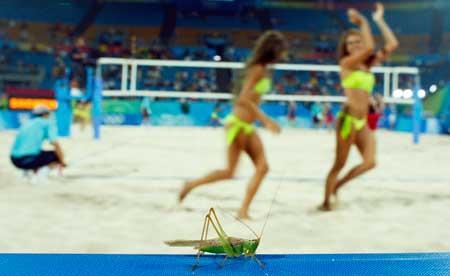Rapid urbanization is rapidly annihilating biodiversity in Beijing, according to research released by the Institute of Zoology at the Chinese Academy of Sciences (IOZ) last week.
 |
| A grasshopper can use five eyes - three simple and two compound - to watch cheerleaders at the men's preliminary Pool E beach volleyball match at the Chaoyang Park Beach Volleyball Ground during the Beijing Olympics on August 9, 2008. (Photo: CFP) |
Within 30 kilometers of the center, one species of insect disappears every five kilometers, the institute research team found after three years' observation and study of insects in 25 parks and green belts.
"The figure of one insect species less is an underestimation," said John MacKinnon, who works for the European Union China Biodiversity Program.
"The actual number is bigger, maybe 50 or even 100 species less per kilometer," he said.
"The reason is that Beijing doesn't have diversified plants and trees to attract diversified insects."
The modern city's impervious land surface is also blocking water from infiltrat-ing into the earth, making it difficult for insects to subsist, explained XIE Yan, an associate researcher of IOZ.
"The best way to make the situation better is to plant more native plants and make the parks in the urban area more natural than artificial."
If one rivet wriggled loose on a plane wing, that might not cause a problem, XIE said.
"But if 100 rivets fall out, then the plane will crash."
The growing imbalance of biodiversity will lead to unhealthy living conditions, she warned.
"Animals and insects are closely connected to the environment we're living in," XIE said.
"The plants and trees in the city cannot live without insects since they carry seeds or help them grow."
The number of birds and other animals is also decreasing together with insects, MacKinnon cautioned.
For example, if Peking University on the Fourth Ring Road has 100 or more species of birds and insects, there may be only 50 or fewer left in Jianguomen on the Second Ring Road, she explained.
"Although we seem to have many trees around," she said, "they are not of many kinds and we are not offering insects a habitable environment since many of the plants and trees we have here are not native."
The city didn't place enough emphasis on biodiversity in its planning, XIE believed.
"We should have more plant coverage and native plants and trees here," she said.
"The Beijing suburbs are doing a better job as they have most of the countryside and wetland parks of Beijing."
The Beijing Municipal Commission of Development and Reform on March 4 last year passed a plan for the construction of 14 rural parks in a bid to provide more natural space for biodiversity.
Beijing's biodiversity has actually been improved in recent years, XIE said.
"Although we still have problems such as birds being trapped in the suburbs." (Global Times)
Related News
Photos
More>>trade
- Chinese Dinosaur Fossils Make North America Debut in Cincinnati
- Human Remains from China Indicate Modern Human Emerged Much Earlier Than
- CAS to Strengthen International Cooperation in 12th Five-year Plan Period
- NATURE: China Pushes for the Proteome
- In Ground-Based Astronomy s Final Frontier, China Aims for New Heights





